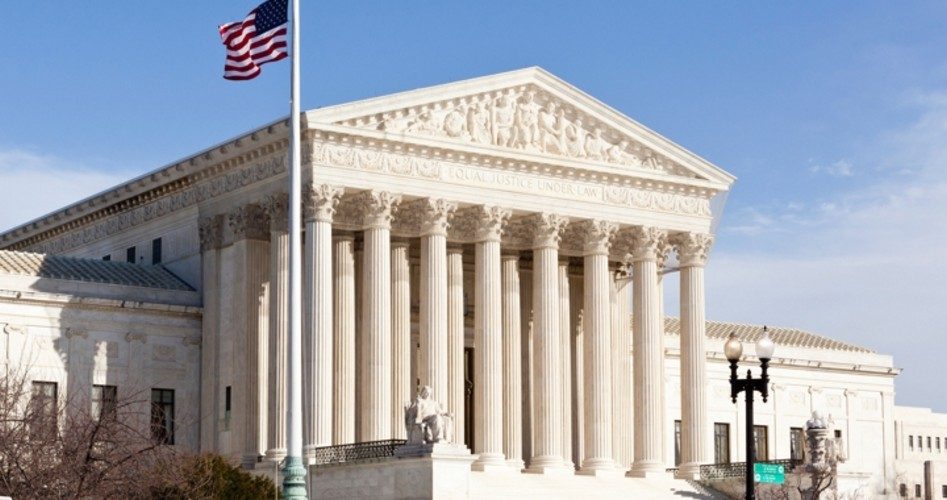
A case before the U.S. Supreme Court could turn the United States from a federal republic into a parliamentary democracy. The case is Gill v. Whitford, and it is before the High Court because a federal court in Wisconsin had ruled 2-1 against the Wisconsin districts.
The argument of the plaintiffs is that Democrats won 51.4 percent of the total votes of the legislative races for the State Assembly (the lower house) in 2012, but managed to win only 39 of 99 seats. In essence, the Democrats are arguing that Wisconsin (and ultimately all state legislative bodies, and one would presume, the U.S. House of Representatives) be selected in a manner similar to that used in the United Kingdom and other parliamentary systems.
In other words, in a manner different from what the Framers set forth in the U.S. Constitution.
They are asking the federal courts to essentially declare the system created by the constitutional framers to be unconstitutional. In the United States House of Representatives we use “single-member districts.” This means that the national vote has no impact on what a specific congressional district decides. The voters in the fourth congressional district of Oklahoma determine what person will represent them in the House of Representatives, and the voters in a district in San Francisco choose to elect Nancy Pelosi. Each district’s vote has no bearing on the outcome of the other’s election. A person is elected to represent the people of his or her district, not the country as a whole, and certainly not a particular political party.
On the contrary, the national vote does determine how many seats each political party will have in Great Britain. Progressives at least as far back as then-Princeton Professor Woodrow Wilson have expressed disgust at the legislative system as it was established in our Constitution, arguing that a parliamentary system such as that used in the U.K. would be superior.
“The main problem for me is [that if those who wish to overturn Wisconsin’s legislative district boundaries succeed], there will naturally be a lot of these claims raised around the country,” commented Chief Justice John Roberts during oral arguments before the Supreme Court on Tuesday. “And every one of them will come for a decision on the merits.”
Roberts was clearly skeptical that federal courts, including the Supreme Court, should get involved in ruling on legislative districting plans (and ultimately, congressional redistricting plans) from all 50 states. The Constitution explicitly gives state legislatures the authority to determine district boundaries, within certain parameters.
Roberts warned that if the Court overturned the plan adopted by the Wisconsin Legislature, “We will have to decide in every case whether the Democrats win or the Republicans win,” based on “sociological gobbledygook.” Roberts added that “the intelligent man on the street” will believe that the Supreme Court is weighing in for one political party over another. If that happened, Roberts said it “is going to cause very serious harm to the status and integrity of the decisions of this Court in the eyes of the country.”
The four Democrat-appointed justices, not surprisingly, took a different stance, and clearly favored overturning the legislative district plan written by a Republican-majority legislative body. The practice of drawing legislative district boundaries to the advantage of the party in power in the legislature is known as gerrymandering, and has been going on since the beginning of the republic.
Justice Samuel Alito called gerrymandering “distasteful,” but indicated that he did not think the Court should reject the plans of legislative bodies. The newest justice, Neil Gorsuch, even ridiculed the standards suggested to allow the Supreme Court to review state legislative districting plans, comparing them to his “steak rub” recipe — “a pinch of this, a pinch of that.”
As usual, the “swing vote” appears to be with Justice Anthony Kennedy. And as usual, he appeared undecided on how he would eventually vote.
The Republican National Committee filed a brief with the Supreme Court that said, “Some voters who support one party are naturally ‘packed’ as a result of residential patterns not connected to legislative choices.” Wisconsin’s Republican Governor Scott Walker was pleased that the U.S. Supreme Court took the case, and expects the Court will reverse the ruling of the lower court. He noted that the district map adopted by the Wisconsin Legislature “very clearly upheld all the criteria that the courts had done in previous decades.”
Democrats have argued that the huge victories they win in urban districts result in “wasted votes” since they don’t necessarily guarantee a majority in the legislative body under the current system. The argument that voters in urban centers such as Milwaukee should dictate to the rest of the state is similar to the reasoning used by those who wish to abolish the Electoral College method of choosing the president. Carrying this “reasoning” to its logical conclusion, the U.S. Senate should be abolished, as well. Finally, it would dictate that the United States have one national election, and if a party received 48.5 percent of the vote nationally, then that party would get 48.5 percent of the total seats in whatever legislative body we have.
And if that happened, our Constitution will have been replaced with a parliamentary system such as that used by the nation from which we declared independence in 1776.



